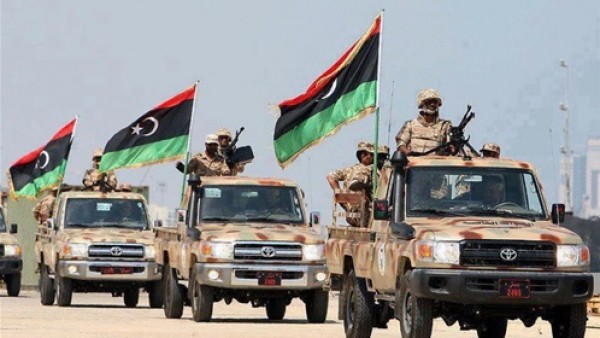Baher Abdel Azeem
Russia’s media quoted Russian Ambassador in Libya, Ivan Molotkov, as saying a few days ago that his country was ready to cooperate with the US in resolving the Libyan crisis, provided that the US had the same desire for cooperation.
The Russian envoy made this comment a short time after Russian President Vladimir Putin declared the end of his country’s main military operations in Syria and the defeat of the self-proclaimed Islamic State of Iraq and Syria (ISIS) there. It amounts to a new attempt by Russia to carve a niche for itself on the Libyan stage.
The Commander of the Libyan National Army (LNA), Gen. Khalifa Haftar, paid a visit to a number of countries in the past months, including Russia, where he discussed possible arms deals.
However, the complicated nature of the conflict in Libya as well as an arms embargo imposed on the country hindered the finalization of those deals.
Egypt plays a big role in backing the LNA. Cairo hosted a meeting recently during which the unification of the Libyan military was discussed.
The Egyptian leadership has scored major successes in this regard. It also played a major role in restructuring the Libyan army by offering Libyan military personnel training to make them capable of honoring their responsibility for defending their country.
Egypt has repeatedly called for lifting the arms embargo on the LNA. Cairo rejects to deal with any of the militias infesting Libya at present. It believes support to the LNA and Gen. Haftar will help them better guard Libya’s shared border with Egypt, 1,200 kilometers-long.
The lack of enough power to guard the border on the Libyan side gives the chance for terrorists to sneak into Egypt and stage attacks.
Russia will deal a deadly blow to terrorist groups active in Libya if it arms the Libyan military. The restive state has already turned into a safe haven for most terrorist groups, especially after the repeated defeats they had sustained in Syria and Iraq.
Molotkov encouraged the Libyans to form a unified army, highlighting the importance of this move for lifting the arms embargo imposed on their country.
So far, he said, there are no guarantees that weapons given Libya would fall into the hands of terrorists at the end of the day.
Molotkov also refuted reports that his country especially put its weight behind Haftar.
“Russia said it more than once that it would not support anybody against anybody,” the Russian diplomat said.
He said his country did not want to sideline any players on the Libyan stage, except, of course, for terrorist groups like ISIS.
Other than this, he added, Russia encourages those who call themselves “patriotic” to find common ground and agree for the best interests of their country.
The Prime Minister of Libya’s National Accord Government, Fayez al-Sarraj, paid a visit, meanwhile, to Tunis yesterday, where he met Tunisian President, Beji Caid Essebsi, to discuss developments on the Libyan stage.
Essebsi said his country backed efforts aiming at bringing about agreement among Libya’s rivals as well as efforts made by the UN Special Envoy to Libya, Ghassan Salama.
The Tunisian President expressed hopes that the Libyans could reach a political settlement to the conflict in their country, one based on the Skhirat Agreement.
The UN Security Council said on Friday the agreement, which was signed in Morocco on December 17th, 2015, remained the only eligible framework for ending the conflict in Libya. The announcement of the council coincided with the second anniversary of the signing of the agreement.
It noted in a statement that was approved by all its 15 members that implementing the Skhirat Agreement was key to holding Libya’s elections and making the required political transition in the country.
The agreement opened the door for the formation of Sarraj’s government. Although the government has succeeded in controlling Libyan capital, Tripoli, and some of western Libya’s cities, it remains to be incapable of controlling large swaths of the country. Eastern Libya’s elected parliament, which backs Haftar, also rejects to recognize Sarraj’s government.
The Security Council said in its statement that it recognized the important role played by Sarraj as well as other Libyan politicians who push for national reconciliation.
There is no military solution, the council said, to the conflict in Libya. It called on all players in the Libyan conflict to show abidance by a ceasefire agreed earlier in the country.







































admin in: How the Muslim Brotherhood betrayed Saudi Arabia?
Great article with insight ...
https://www.viagrapascherfr.com/achat-sildenafil-pfizer-tarif/ in: Cross-region cooperation between anti-terrorism agencies needed
Hello there, just became aware of your blog through Google, and found ...